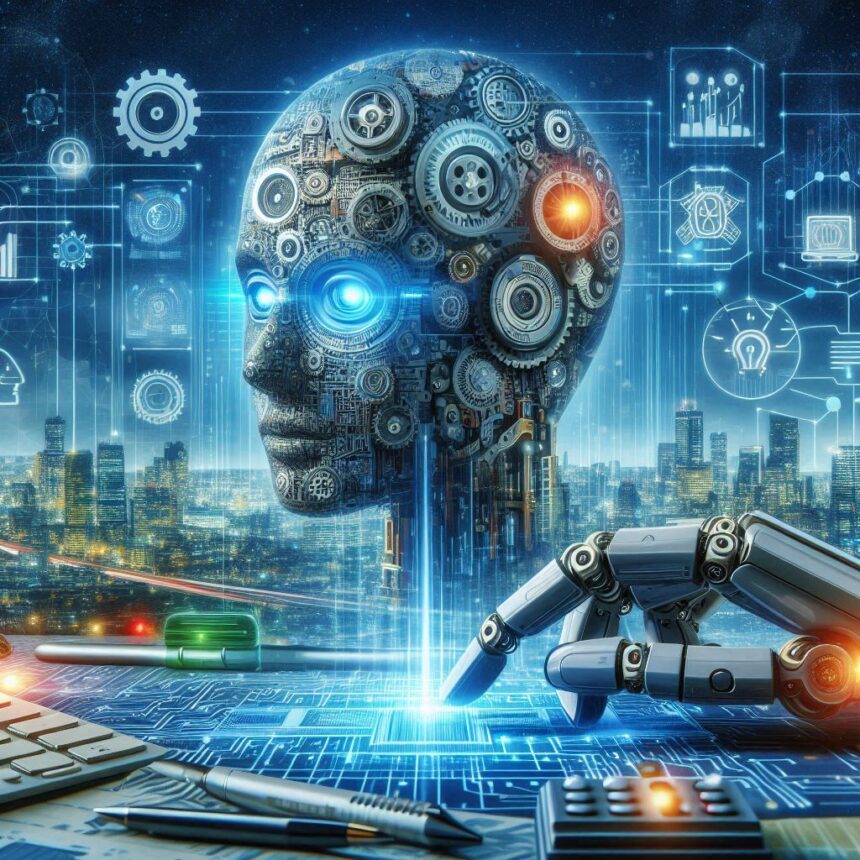Artificial intelligence is transforming industries, and IT operations are no exception. AI-powered DevOps, also known as AIOps, is becoming a game-changer for businesses striving to achieve greater system reliability. By leveraging machine learning models to analyze both historical and real-time cloud data, organizations can detect patterns and anomalies that may lead to system failures.
Recent reports show that companies using AI-powered monitoring have experienced a 25% reduction in unplanned outages, leading to improved customer satisfaction, operational efficiency, and reduced downtime costs. As artificial intelligence creators continue to refine these solutions, DevOps teams are gaining powerful tools to optimize performance and ensure system resilience.
Let’s explore how AI is enhancing system reliability, the key technologies driving this transformation, and what it means for the future of IT operations.
The Evolution of DevOps with AI
Traditional DevOps relies on automation and continuous integration/continuous deployment (CI/CD) to streamline software delivery. However, challenges such as unexpected system failures, resource inefficiencies, and lack of predictive insights often limit the effectiveness of conventional DevOps approaches.
AI changes this by introducing proactive monitoring, predictive analytics, and autonomous remediation. By analyzing data from applications, infrastructure, and networks, AI systems can detect issues before they escalate, reducing downtime and improving system reliability.
Key Features of AI-Driven DevOps
Predictive Maintenance: AI algorithms analyze historical data to predict when system components are likely to fail.
Anomaly Detection: Machine learning models identify unusual patterns in system behavior, alerting DevOps teams before an outage occurs.
Automated Incident Response: AI can autonomously resolve issues, minimizing downtime and reducing the need for manual intervention.
Root Cause Analysis (RCA): AI accelerates the identification of the root causes of incidents by analyzing vast datasets.
How AI Reduces System Outages by 25%
Organizations implementing AI-driven DevOps are seeing remarkable improvements in operational reliability. According to recent industry data:
25% Reduction in Unplanned Outages: AI-powered monitoring systems can predict failures with high accuracy, preventing costly downtime.
30% Faster Incident Resolution: AI’s automated incident management streamlines the troubleshooting process.
40% Improvement in Operational Efficiency: DevOps teams can allocate more time to innovation instead of firefighting system issues.
For example, leading financial institutions have adopted AI to monitor transactions and detect anomalies in real-time, preventing fraudulent activities and maintaining seamless services. Similarly, e-commerce companies rely on AI to predict server failures during peak shopping seasons, ensuring uninterrupted service.
The Role of Machine Learning in AIOps
Machine learning (ML) is at the core of AI-powered DevOps. By continuously learning from data, ML models can detect patterns and trends that would be impossible for humans to identify manually.
Types of Machine Learning Models in AIOps
Supervised Learning: AI models are trained using labeled datasets, enabling them to predict specific outcomes such as system failures.
Unsupervised Learning: These models identify anomalies by detecting deviations from normal behavior without needing labeled data.
Reinforcement Learning: AI learns through trial and error, optimizing system performance by adapting to changing environments.
Example Use Case: Anomaly Detection in Cloud Infrastructure
An AI model continuously monitors cloud infrastructure logs, analyzing millions of events in real-time. When the system detects abnormal spikes in CPU usage or memory consumption, it immediately alerts DevOps teams, preventing a potential outage. Over time, the AI refines its predictions, reducing false positives and enhancing reliability.
AI-Driven DevOps Tools and Platforms
Numerous AI-powered tools are available for implementing AIOps. Some popular platforms include:
IBM Watson AIOps: Provides AI-driven insights for faster incident resolution.
Splunk AI: Uses ML algorithms for log analysis, anomaly detection, and predictive analytics.
Datadog APM: Monitors application performance using AI-powered diagnostics.
Dynatrace: Offers end-to-end observability and AI-driven problem detection.
These platforms empower DevOps teams to proactively manage IT infrastructure and applications, minimizing downtime and ensuring system stability.
The Impact on Business Operations
Adopting AI in DevOps results in significant business benefits:
Enhanced Customer Experience: Faster incident resolution means fewer service interruptions for users.
Cost Savings: Preventing system failures reduces financial losses caused by downtime.
Operational Agility: AI-powered automation frees up DevOps teams to focus on innovation.
Data-Driven Decision Making: AI provides actionable insights that improve infrastructure management.
In sectors like finance, healthcare, and telecommunications, reliable system performance is critical. AI-driven DevOps ensures these industries maintain operational resilience, delivering seamless digital experiences.
Challenges and Considerations in Implementing AI for DevOps
While AI-driven DevOps offers transformative benefits, it comes with its own set of challenges:
Data Quality and Management: AI models require large volumes of accurate data to generate reliable predictions.
Integration Complexity: Implementing AI into existing DevOps workflows can be complex and time-consuming.
Skill Gaps: Organizations need data scientists and AI specialists to build and manage AI models effectively.
Over-Reliance on AI: While AI can automate many processes, human oversight is still essential for handling complex incidents.
To overcome these challenges, businesses should invest in AI training programs, collaborate with experienced AI solution providers, and implement AI gradually across their DevOps pipelines.
The Future of AI in DevOps
Looking ahead, AI’s role in DevOps will continue to expand, with advancements in areas like:
Self-Healing Systems: AI will detect, diagnose, and resolve system issues autonomously.
AI-Powered Chatbots: Virtual assistants will support DevOps teams by providing real-time insights and recommendations.
Proactive Security Management: AI will enhance cybersecurity by detecting and mitigating threats in real time.
As artificial intelligence creators develop more sophisticated models, organizations will gain even greater control over their IT environments, ensuring optimal performance and reliability.
Final Thoughts
AI-driven DevOps represents a significant shift in how businesses manage their IT operations. With the ability to predict, prevent, and resolve system failures, AI enhances reliability, reduces downtime, and strengthens customer confidence.
By embracing AI-powered monitoring and predictive analytics, organizations can unlock the full potential of their digital infrastructure. The future of DevOps is undoubtedly intelligent, automated, and resilient.
Further Reading: Explore More AI Innovations
For more insights into how AI is transforming industries, check out these related articles:
